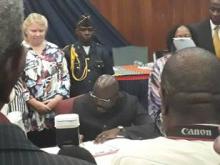Land Library
Bienvenido a la biblioteca de Land Portal. Explora nuestra amplia colección de recursos de acceso abierto (más de 74.000), que incluye informes, artículos de revistas científicas, trabajos de investigación, publicaciones revisadas por pares, documentos jurídicos, vídeos y mucho más.
/ library resources
Showing items 1 through 9 of 24.The Landassess Tool is a risk assessment and management framework. It provides a clear and simple set of checklists that generate a report to help companies assess and manage how they respect land rights.
In a watershed moment for land rights in Liberia and across Africa, President George Weah on Sept. 19 signed into law a land reform bill that extends land rights to millions of rural Liberians.
Land is the most important asset for many rural Liberian women and men, and is often a family’s primary source of cash income, food and nutritional security, health care, and education.
This article seeks to investigate whether concern for food security and investment liberalization are the principle drivers of land-grabbing in Africa.
African universities have a key role to play in developing technical and human capacities to support land policy development and implementation, according to experts attending a two-day meeting to validate a study on ‘Land, Ethnicity and Conflict in Africa’, held last month in Addis Ababa, Ethiop
The Financial and Fiscal Commission (the Commission) undertook a study into the land reform programme. Part of the problem is that land reform is framed within the narrow confines of agriculture and does not take into account the inherent sectoral challenges.
Political resistance towards international development is a prevalent theme in global civil society and
As a country we need to prioritise the acquisition and development of land for settlement purposes if we are to make any impact on the demand for housing. Between 1994 and 2014 the South African government provided more than 2.5 million houses and some 1.2 million serviced sites, but the ho
Census surveys of land transactions show that 203,300 hectares of KwaZulu-Natal’s commercial farmland transferred to previously disadvantaged South Africans over the period 1997-2003. This represents 3.8 per cent of the farmland originally available for redistribution in 1994.









